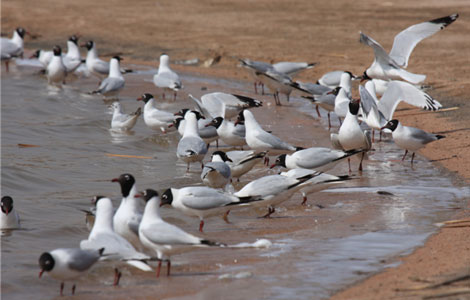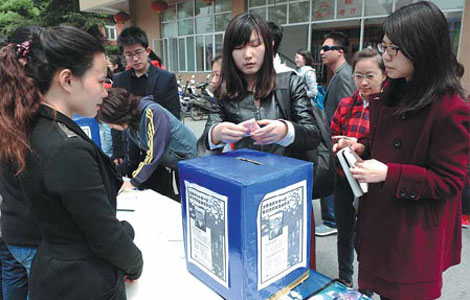Scientists paying more to reach world
Updated: 2013-05-10 01:45
By CHENG YINGQI (China Daily)
|
|||||||||||
The fast-growing economy has had one unintended consequence: Scientists must pay more if they want to get published in international journals, which no longer consider China a low-income country.
For example, US online publication PLoS One charges Chinese researchers as much as $1,350 per article, a standard fee for contributors from the United States and Europe.
In comparison, it charges nothing for papers submitted from low-income countries such as Afghanistan, Cambodia and Ethiopia, while charging $500 for lower-middle-income countries such as India, Cuba and Egypt, in accordance with a country's per capita GDP and investment in science and technology.
Many other international journals do not recognize China as a developing economy.
Li Jing, a Chinese researcher working in Finland, used his blog to call on Chinese scientists to boycott PLoS One - and more than 60 scientists signed up to protest the fees.
However, the nation's scientists believe the ultimate solution lies closer to home.
Wu Yishan, deputy director of the Institute of Scientific and Technical Information of China, said: "Although China produced 168,000 sci-tech papers in 2012 - the second highest number in the world - the vast majority of these papers are published in foreign journals, because our domestic sci-tech publications are far less influential than foreign publications. There are several excellent journals in China, but the number is too small. Most first-class papers go to foreign journals, because the author wants the recognition of the international science community," Wu said.
"China needs better science journals to provide a better platform for our own scientists."
The institute, under the Ministry of Science and Technology, is designed to provide decision-making support to government agencies and keep the science and technology community up to date.
In 2000, only 47 of China's sci-tech publications were included in the Science Citation Index published by Thomson Reuters, which covers the world's most notable and significant journals across 100 disciplines.
By 2011, the number had increased to 155, accounting for 1.9 percent of all SCI journals.
Related Stories
Academic elected into US science academy 2013-05-03 00:56
Academic leader launches French platform 2013-01-15 19:16
Ministry calls for curbing academic corruption 2013-03-09 15:49
Regulation to curb academic degree fraud to take effect 2013-01-01 00:45
Quality of academic papers rises 2012-12-08 08:00
Today's Top News
Producer Price Index continues to decline
India's top diplomat praises cooperation
China urges UK concrete action for ties
Scientists paying more to reach world
Possible EU punitive duties opposed
Japan protests Okinawa report
Domestic violence by men 'shocking': survey
Director accused of violating family planning policy
Hot Topics
Lunar probe , China growth forecasts, Emission rules get tougher, China seen through 'colored lens', International board,
Editor's Picks

|

|

|

|

|

|





